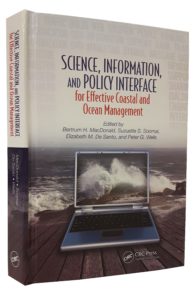“The Science-Policy Interface in Coastal and Ocean Management” is a series of posts highlighting the chapters in the new book: Science, Information, and Policy Interface for Effective Coastal and Ocean Management, edited by Bertrum H. MacDonald, Suzuette S. Soomai, Elizabeth M. De Santo, and Peter G. Wells, published by CRC Press (Taylor & Francis).
Hillary Clinton says, “I believe in science.” It is remarkable that she felt compelled to say so, but the past 30 years has seen declining trust in science among American Conservatives. For example, Stephan Lewandowsky, Gilles Gignac, and Klau Oberauer of the University of Western Australia noted in 2013 that “[c]limate science has become particularly polarized, with Conservatives being more likely than Liberals to reject the notion that greenhouse gas emissions are warming the globe” (Lewandowsky, Gignac & Oberauer, 2013).
Why do so many Americans seem disinterested or clueless about how to find trustworthy information on policy issues like global climate change, Genetically Modified Organisms (GMOs), and coastal conservation? Many stakeholders, such as fishers, tourism workers, farmers, dockworkers, health workers, and the general public, have no idea, for example, what position to take on controversial coastal management topics like water-pollution regulation, restrictions on pesticide and fertilizer use, fishing moratoria, and port development. Insofar as public policies on these issues are shaped by stakeholder input, both inaction and misguided actions can be destructive. The challenge, then, is to motivate and guide stakeholders to find and understand sound information, so they can engage in the policy discourse in ways that promote their self-interest.
There are three epistemological reasons why Americans fail to base their political opinions on sound knowledge. They either 1) don’t know the implications of the potential outcomes, 2) are not convinced the search effort is worth it, or 3) think they know enough about the issue to pick sides.
Our chapter in Science, Information, and Policy Interface for Effective Coastal and Ocean Management explains how stakeholders who may be unaware of the risks or opportunities involved in what seem to be technical, scientific issues lack the motivation that stems from a recognition of relevance and urgency. Even if stakeholders recognize the importance of an issue, they may not have much faith that a more concerted search for relevant information would help them make decisions, either because they doubt that 1) constructive understanding is within their grasp, or 2) the knowledge would help them engage in effective action. Third, and often most troubling, they may presume that their understanding, based on prior knowledge, is sufficient to make sound decisions without seeking more up-to-date, comprehensive, and/or nuanced information.
Even so, we have found that surprisingly robust approaches that can motivate people to conduct better searches. However, these approaches may not be in the wheelhouse of the scientists, engineers, planners, and policymakers who wish to have a more informed public.
So what are the approaches that can motivate deeper searches? Curiosity is not enough; people are busy, so unless an appeal can be made that insecurity can be reduced through mastery of relevant knowledge, better searches require additional incentives. Technical information is not enough; along with the knowledge needed to take a position on pressing policy issues, stakeholders need to receive additional information to know how to act on that knowledge. This often requires understanding how to influence policy, how policies are made, and what it takes to organize effectively.
Fortunately, individual stakeholders need not act alone. Stakeholder groups (farmers’ organizations, fishermen’s associations, etc.), environmental non-governmental organizations (NGOs), and civic organizations can cultivate some of their members as “lay experts” to engage in better searches for relevant knowledge. This can be done at very low economic cost, by providing social rewards (recognition of expertise, formal positions within the organization, etc.) to these lay experts. Even in the absence of formal social rewards, government and civic organizations can provide social and emotional rewards through stakeholders’ identification with a cause, status among peers, and desire for a greater sense of mastery.
In addition, policy scientists and experts in the relevant technical fields can translate jargon and explain how different public policy outcomes might affect stakeholders. This liaison role requires experts with a knack for this sort of translation, incentives for them to engage in interactions with stakeholders, and a platform that engenders reciprocal trust.
The individual book chapters are available from the publisher’s website: Chapter 7
The full book is available in print and e-book formats from the publisher at this link
Authors: Diana Ascher and William Ascher
Reference
Lewandowsky, S., Gignac, G. E., & Oberauer, K. (2013). The role of conspiracist ideation and worldviews on predicting rejection of science. PLoS One, 8(1): e 75637. doi:10.1371/journal.pone.0075637
